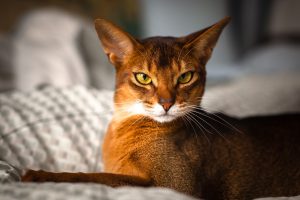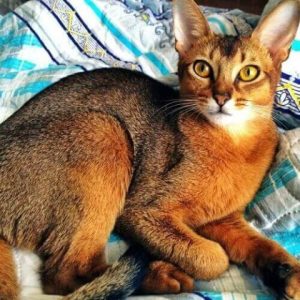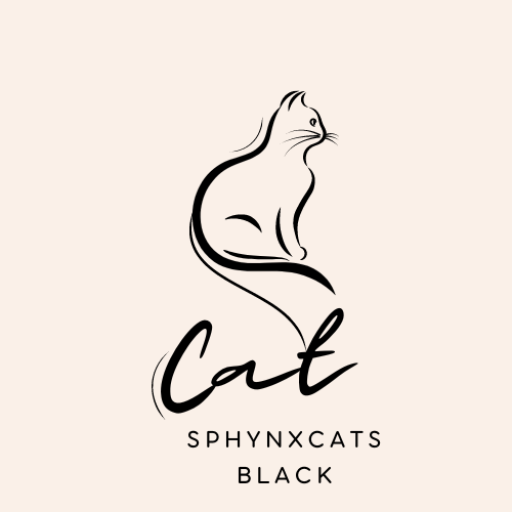The Abyssinian cat, often referred to as the “Aby,” is a distinctive and elegant breed known for its striking appearance, playful nature, and active disposition. Here’s more information about Abyssinian cats:
- Physical Appearance: Abyssinian cats have a medium-sized, sleek, and well-muscled body with a short, fine coat that lies close to their skin. Their coat features a ticked or agouti pattern, where each hair is banded with multiple colors, giving them a wild appearance. They have large, expressive almond-shaped eyes and distinctive, alert ears.
- Temperament: Abyssinian cats are known for their lively and active personalities. They are playful, curious, and love to explore their surroundings. Abys are also social and enjoy interaction with their human family members. They are often described as “busy” cats due to their high energy levels.
- Intelligence: Abyssinians are highly intelligent cats and enjoy mental stimulation. They excel in puzzle games and interactive toys that challenge their minds. They are quick learners and can be taught tricks.
- Vocalization: Abys are not excessively vocal, but they are not typically shy about using their voices to communicate with their owners. They may emit soft, chirpy sounds and meows.

abyssinian cat price
Health Considerations: abyssinian cat
- Abyssinian cats are generally healthy, but like all breeds, they can be prone to certain genetic health issues. These may include gingivitis, dental problems, and a genetic kidney condition called pyruvate kinase deficiency (PKD). Regular veterinary check-ups are essential.
- Origin: Despite their name, Abyssinian cats are not from Abyssinia (modern-day Ethiopia). Their exact origin is unclear, but they are believed to have been bred in Britain from cats that were imported from Southeast Asia and possibly Africa in the late 19th century.
- Popularity: Abyssinian cats are a popular and beloved breed among cat enthusiasts worldwide, appreciated for their striking appearance and lively personalities.
- Indoor Living: Due to their active nature and short coat, Abyssinian cats are best suited for indoor living to protect them from potential dangers and ensure their well-being. They thrive in a safe and stimulating indoor environment.
- Grooming: The short coat of an Abyssinian requires minimal grooming. Regular brushing helps keep their coat in good condition and minimizes shedding.
- Adoption: Consider adopting an Abyssinian cat from a rescue organization or shelter. While less common than domestic cats, Abyssinians do occasionally become available for adoption, providing a loving home to a cat in need.
Abyssinian cats make wonderful companions for individuals and families who can provide them with the mental and physical stimulation they require. They thrive in homes where they receive attention, playtime, and interaction. When acquiring an Abyssinian, choose a responsible breeder or consider adopting from a reputable source that prioritizes the welfare of their cats.
abyssinian
The Abyssinian cat, often referred to as the “Aby,” is a distinctive and elegant breed known for its striking appearance, playful nature, and active disposition. Here’s more information about Abyssinian cats:
- Physical Appearance: Abyssinian cats have a medium-sized, sleek, and well-muscled body with a short, fine coat that lies close to their skin. Their coat features a ticked or agouti pattern, where each hair is banded with multiple colors, giving them a wild appearance. They have large, expressive almond-shaped eyes and distinctive, alert ears.
- Temperament: Abyssinian cats are known for their lively and active personalities. They are playful, curious, and love to explore their surroundings. Abys are also social and enjoy interaction with their human family members. They are often described as “busy” cats due to their high energy levels.
- Intelligence: Abyssinians are highly intelligent cats and enjoy mental stimulation. They excel in puzzle games and interactive toys that challenge their minds. They are quick learners and can be taught tricks.
- Vocalization: Abys are not excessively vocal, but they are not typically shy about using their voices to communicate with their owners. They may emit soft, chirpy sounds and meows.
- Health Considerations: Abyssinian cats are generally healthy, but like all breeds, they can be prone to certain genetic health issues. These may include gingivitis, dental problems, and a genetic kidney condition called pyruvate kinase deficiency (PKD). Regular veterinary check-ups are essential.
- Origin: Despite their name, Abyssinian cats are not from Abyssinia (modern-day Ethiopia). Their exact origin is unclear, but they are believed to have been bred in Britain from cats that were imported from Southeast Asia and possibly Africa in the late 19th century.
- Popularity: Abyssinian cats are a popular and beloved breed among cat enthusiasts worldwide, appreciated for their striking appearance and lively personalities.
- Indoor Living: Due to their active nature and short coat, Abyssinian cats are best suited for indoor living to protect them from potential dangers and ensure their well-being. They thrive in a safe and stimulating indoor environment.
- Grooming: The short coat of an Abyssinian requires minimal grooming. Regular brushing helps keep their coat in good condition and minimizes shedding.
- Adoption: Consider adopting an Abyssinian cat from a rescue organization or shelter. While less common than domestic cats, Abyssinians do occasionally become available for adoption, providing a loving home to a cat in need.
Abyssinian cats make wonderful companions for individuals and families who can provide them with the mental and physical stimulation they require. They thrive in homes where they receive attention, playtime, and interaction. When acquiring an Abyssinian, choose a responsible breeder or consider adopting from a reputable source that prioritizes the welfare of their cats.

abyssinian cat price
abyssinian guinea pig
The Abyssinian guinea pig is a popular and distinct breed of guinea pig known for its unique and attractive appearance. Here are some key characteristics and information about Abyssinian guinea pigs:
- Coat: The most distinguishing feature of the Abyssinian guinea pig is its coat, which is characterized by rosettes or whorls of hair all over its body. These rosettes create a textured and tufted appearance, giving the guinea pig a distinctive and wild look. The coat can come in various colors and patterns.
- Size: Abyssinian guinea pigs are small rodents, typically measuring 8 to 10 inches (20 to 25 cm) in length and weighing around 2 to 3 pounds (0.9 to 1.4 kg) when fully grown.
- Temperament: Abyssinian guinea pigs are known for their friendly and sociable nature. They are gentle and often enjoy interacting with their human caregivers. They can be vocal and may produce soft sounds to communicate their needs or express excitement.
- Lifespan: Guinea pigs, including Abyssinians, have a relatively long lifespan for small rodents. They typically live for around 5 to 7 years, although some may live longer with proper care.
- Housing: Provide an appropriate and spacious enclosure for your Abyssinian guinea pig. A large cage or hutch with plenty of space for exercise and exploration is essential. Guinea pigs should be kept indoors or in a sheltered outdoor area protected from extreme temperatures.
- Diet: A balanced diet is crucial for the health of Abyssinian guinea pigs. They require a diet consisting of fresh hay, fresh vegetables (such as leafy greens), high-quality guinea pig pellets, and access to clean water. Avoid feeding them foods that are harmful to guinea pigs, such as sweets, chocolate, or foods high in sugar.
- Grooming: Due to their unique coat, Abyssinian guinea pigs may require regular grooming to prevent matting and maintain their appearance. Brushing their hair gently and providing occasional baths can help keep their coat clean and healthy.
- Social Animals: Guinea pigs, including Abyssinians, are social animals and thrive in the company of other guinea pigs. Consider adopting a pair or a small group to ensure their social and emotional well-being.
- Health Care: Regular veterinary check-ups are essential to monitor your Abyssinian guinea pig’s health. They are prone to certain health issues, such as dental problems and skin irritations, so it’s important to provide proper care and attention.
- Adoption: Consider adopting an Abyssinian guinea pig from a rescue organization or shelter. Many guinea pigs, including purebred Abyssinians, are in need of loving homes.
Abyssinian guinea pigs make delightful and charming pets for individuals and families who appreciate their unique appearance and friendly personalities. They require proper care, attention, and companionship to lead happy and healthy lives.

